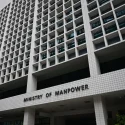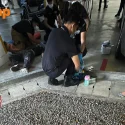SINGAPORE – In the rapidly evolving global landscape marked by intense competition, Singapore must do more than simply steward what the earlier generations have built, said Coordinating Minister for Social Policies and Minister for Health Ong Ye Kung.
There is also a need for courage to do things differently, so as to build upon this inheritance and transform it into something better.
Managing this balance between stewardship and enterprise will be a key challenge for the fourth-generation political leadership, he said on Oct 9 at the closing of the
Asia Future Summit
.
“A failure to be enterprising to chart a new future is just as damaging as a failure to steward accumulated resources from the past,” he added.
Mr Ong’s speech and dialogue, moderated by Lianhe Zaobao editor Goh Sin Teck, wrapped up the annual conference that was held over two days from Oct 8 to 9.
The theme – Navigating A Fractured World – reflects the turbulence of today’s geopolitical flux, technological bifurcation and economic volatility.
At this juncture of Singapore’s history, the first instinct is, and should be, to avoid recklessness and to steward what earlier generations of Singaporeans have built, said Mr Ong.
But he cautioned that there is also a risk to focusing too narrowly on this.
“For every story of a new generation squandering away their inherited wealth, there is also one of atrophy, because they were so focused on protecting the past that they could not renew and keep up with the times,” he said.
He noted it is often said that complacency is the biggest threat facing Singapore today, adding that there are two types of complacency.
One is associated with hubris and the decadence of success, and empires have fallen because of that.
The other has to do with being too timid and constrained by tradition or rules, and is far more insidious, Mr Ong said.







